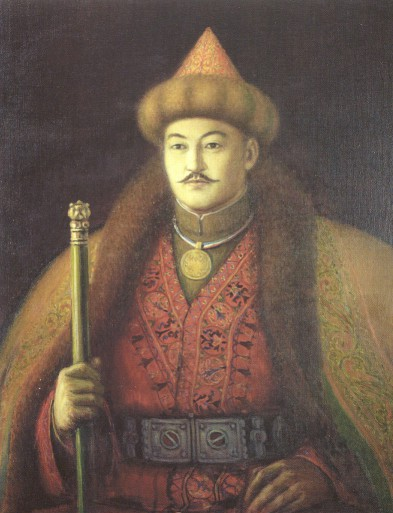
“… If the sciences bring such great benefits, then our grandchildren will not be able to live well without them. Every effort, every expenditure of money will bring a hundred times more fruit if they are used for the education of youth…”
Zhangir Khan
Zhangir khan (1801-1845) – the last khan of the Boke horde (1823-1845), son of Boke Khan, grandson of Nurala, great–grandson of Abulkhair, real name – Zhihanger. Honorary member of Kazan University.
In 1815, according to the tradition of inheritance, his father handed over the khan’s throne to Zhangir, but since Zhangir was still too young, the khanate was ruled by Bokey’s brother, Sultan Shygai. Until 1823, Zhangir was educated according to the European model, lived in the house of the Astrakhan governor Andreevsky. There he also gained knowledge on the administrative methods of managing the khanate.
In 1823, when Zhangir Bokeuly took over the khanate, the political situation was confusing. Due to the shortcomings made in the division of lands, he was forced to take a number of unpopular measures against the people. Russia took advantage of this circumstance in order to colonize the Kazakh lands. One of the main economic restrictions imposed by Russia was the ban on the use of the coasts of the Caspian Sea, Volga and Yaik. Kazakhs had no rights to fish and use water for livestock.
The policy pursued by Zhangir eventually led to the uprising of the Kazakh Sharua (1836-1837) under the leadership of I. Taimanov and M. Otemisova. This uprising was directed against the Kazakh feudal lords and the colonial policy of Russia. Zhangir Khan suppressed the uprising with the help of Russian troops.
The methods of administrative management, learned by Zhangir from the Russian governor, had a great influence on his policy. During the administration of the khanate, he implemented a number of reforms. A spiritual service, akhun, was introduced into this system. At the same time, the number of Muslim schools and madrasas has also increased.
Zhangir Bokeuly is one of the first creators of museum collections of household items and cultural history of the Kazakh people. Under him, a trade fair was organized in the Bukeevskaya Horde (1832, Khan’s fair), medical departments, a pharmacy (1838), an archive were opened, and a map of the khanate was created. Under his leadership, a museum was opened in the Bukeevskaya Horde, where valuable military weapons were stored.
In 1841, Zhangir opened a school at his own expense, where M.-S. Babajanov, M. Bekmukhamedov, K. Shigaev and others were educated.
Zhangir Khan himself was an educated man. He knew Arabic, Russian, Persian, Tatar, and German languages well. Zhangir Khan was an honorary member of the scientific society at Kazan University. In 1843, he received the rank of Major General of the Tsarist army. He was engaged in breeding high-bred horses, studying folk literature and collecting pedigree books of Kazakhs, and wrote a number of epic works himself.
Under Zhangir, a new management system was introduced in the Bukeev Horde, the khanate was divided into 12 administrative units controlled by biys. The Council of biys and Khan’s representatives, the Institute of Tarkhans, was restored.
Zhangir Khan made a number of changes to the economic relations between the subjects of the two states. He was a proponent of a settled life, and in order to give this a go, he introduced private ownership of land, carried out a number of measures to strengthen tax collection.
In 1845, Zhangir Khan died suddenly, under unclear circumstances. He was the third and last khan of the Bokeev horde. After him, the khan’s power was no longer inherited.
On May 30, 2003, the West Kazakhstan Agrarian and Technical University was named after Zhangir Khan, an outstanding statesman, educator and reformer of the XIX century, by Decree of the Government of the Republic of Kazakhstan No. 497
